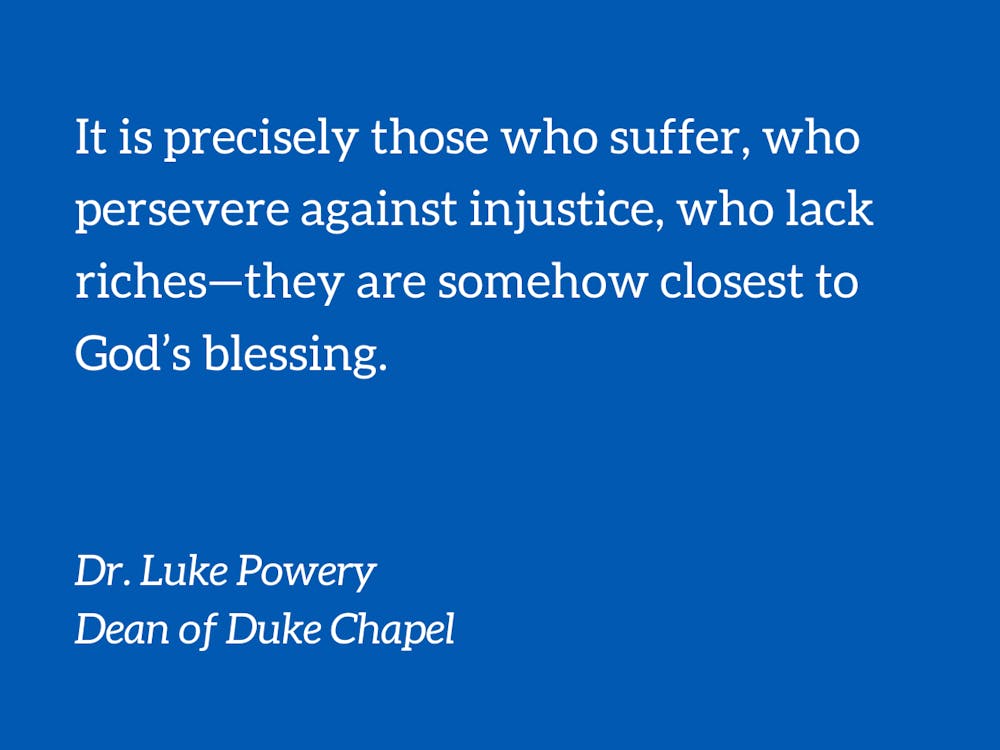Apparently, people want to be blessed. The hashtag #blessed has more than 100 million posts on Instagram, and videos on TikTok with this hashtag have been viewed billions of times. I am glad people want to be blessed, but there is a paradox about who is truly blessed.
If you scroll through Instagram, you might think that blessings primarily come to people traveling to sunny locations, wearing expensive clothes, lifting heavy weights, or reciting inspirational quotes. These images of blessing are aligned with the so-called prosperity gospel movement. It’s a topic my colleague and friend Dr. Kate Bowler at Duke’s Divinity School writes about in her book titled “Blessed.” Within this movement’s theology is the idea that God’s blessing is the engine for social mobility, increasing wealth, and good health, and thus the manifestation of these things is a visible sign that you are blessed. For this theological camp, Dr. Bowler explains, to be blessed is all about materiality—economic and physical.
The problem with this way of thinking is that it doesn’t have much to say when bad things happen to good people. What about the dedicated teacher whose retirement savings gets wiped out in a stock market crash? What about the beloved aunt who is diagnosed with cancer while she is still young? What about the young man unjustly convicted of a crime? Are they not blessed by God?
The testimony of the Bible tells me otherwise. It is precisely those who suffer, who persevere against injustice, who lack riches—they are somehow closest to God’s blessing. In the famous “Sermon on the Mount,” Jesus describes these blessed people as “the poor in spirit,” “those who mourn,” “the meek,” and “those who hunger and thirst for righteousness.”
This type of blessedness is not only something I have read about; it is also something I have experienced.
Many years ago, I went to one of the most impoverished communities in Nairobi, Kenya, with pastors from Europe, the Middle East, and Africa. We visited the Shangalia orphanage for former street children. On one side of the orphanage’s small courtyard were the sleeping quarters, rooms packed with rows of metal bunk beds from the floor up to the ceiling. On the other side of the courtyard were the classrooms where the children learned basic subjects like language arts, math, and science. At one point, our pastoral delegation sat in the courtyard as the children recited scripture, sang religious and cultural songs, played instruments, danced, and performed other acrobatic tricks. The children repeated a phrase we hear in churches throughout the world—“God is good, all the time, and all the time, God is good.” Over and over and over again, “God is good, all the time, and all the time, God is good.” They said this of their own volition. They smiled. They clapped. They seemed happy.
Onlookers might say these children had nothing, but it seemed as if they had everything. I had a good job and loving family and great education. But these orphans were recipients of a
mysterious-unimaginable-grace. Amid extreme poverty, they were a visible expression of what it means to be truly blessed.
This semester, I have experienced this “holy paradox” of who is truly blessed while teaching a class at a prison in the area. The students in this course come from Duke Divinity School as well as the men incarcerated at the prison. In this place filled with sadness and grief and remorse, I have been learning about what it means to be blessed. One student mentioned how even during trials and tribulations there can be a type of tranquility. Another spoke up and said, “none of us deserve to be forgotten.” And another wrote me an encouraging note and gave it to me at the end of class; it said, “God has used you as a beautiful fountain of his love.”
What? Who is blessing whom?
The holy paradox of blessing is present even in a prison. Your body might be chained but your spirit can still be free. To be blessed is not about the things we possess but about the nature of our heart and character. Blessed are those who mourn over mass shootings. Blessed are the peacemakers in the face of violence and war. Blessed are the children without parents who dance and sing with joy. These are images of true blessing.
So, if you want to be blessed, you don’t need to look on social media. Instead, look for the beaten down ones, the downtrodden ones, the hurting, the hungry, the howling and helpless ones. It is among these that you will be truly #blessed.
The Rev. Dr. Luke A. Powery is Dean of Duke University Chapel. His column runs on alternate Mondays.
Get The Chronicle straight to your inbox
Signup for our weekly newsletter. Cancel at any time.

